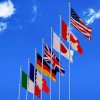- Date
- 16 June 2021
G7 Gathering: Outcomes of The G7 Summit
G7 Gathering: Outcomes of The G7 Summit
By Curtley Bale |
The Story
Over the weekend, the UK hosted the G7 summit at Carbis Bay in Cornwall. Leaders from the UK, US, Canada, Germany, France, Italy, and Japan descended onto the Cornish beachfront to discuss issues ranging from China and Covid-19, to global corporation tax and climate change. The G7 leaders were joined by the Presidents of the European Commission and European Council, as well as leaders from the emerging economies of Australia, South Korea, South Africa, and India.
What It Means For Businesses and Law Firms
From the outset, President Biden made it clear that “America and diplomacy is back” (White House sources). His first overseas trip was designed to bring the US back into the global fold after the controversial policies pursued by President Trump. The summit reached an agreement on global corporation tax - to tax multinational companies in the jurisdictions where they sell products or services, as opposed to where they are headquartered. This is seen as a huge step in tackling giants such as Amazon, Google, and Facebook, who have been accused of paying insufficient tax, despite earning billions.
The G7 committed to a minimum tax rate of 15%, amidst scepticism from big multinational companies that the group would be able to convince smaller countries to give up the attractiveness of operating as a tax haven (Financial Times).
China and trade were important points of discussion at the summit, with Biden keen to align himself with the other nations and the EU in diluting China’s growing influence on world trade. The nations committed to co-operate with China on climate change but to challenge them in relation to human rights issues and forced labour (Financial Times). This unified stance on China is likely to carry over into this week’s NATO summit, where European leaders will hope Biden remains staunch in his meetings with China and Russia.
The G7 countries also committed to donating one billion vaccine doses to developing countries over the next year. There continues to be tension between the US and EU over America’s apparent willingness to waive patent waivers for the vaccines (The Guardian). The G7 also committed to a green infrastructure project to “counter China’s Belt and Road Initiative” (City AM), to help increase development in a green way, with transparent finance and loans (NBC). The summit’s host, Boris Johnson, also put climate change on the agenda, pledging to close down coal-fired plants, and to transition away from combustion engines.
Combined with visits from various members of the Royal Family, Johnson will be hoping the summit is seen as a success across the world, and will allow him to build on these foundations of global co-operation.
